‘Tuberculosis, HIV and reproductive tract infections are the main reasons why migrants can't stay in Russia’
The number of people infected with syphilis among the migrants increased in Tatarstan
During two days in Kazan, experts will discuss a problem that is of concern of not only Russia but also Europe now – a growing flow of migrants and refugees. Great attention is paid to their adaptation in Tatarstan. The republic has things to teach. At the same time there is another problem that has no less importance against a background of the increasing migration – a rising amount of migrants with HIV. As a correspondent of Realnoe Vremya found out at the opening of the conference, this problem is not topical in the republic at the moment. But we have to speak about a growing syphilis morbidity rate.
Migration issues under the aegis of the UN
An international scientific conference called Migration in Eastern Europe and Central Asian Countries opened in IT-Park on 26 September, which became a continuance of the UN General Assembly Summit for Refugees and Migrants that has taken place this week. The government of the Republic of Tatarstan and the Federal Service for Surveillance on Consumer Rights Protection and Human Wellbeing (Rospotrebnadzor) were the main organisers.
Acting PM of Tatarstan Aleksey Pesoshin opened the conference with the words that Tatarstan was a dynamically developing republic. This is why migration issues, especially labour migration, has been very topical today.
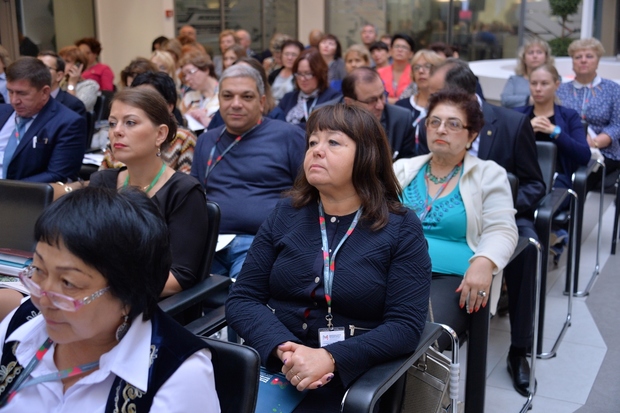
'It goes without saying, we express our readiness to favour the promotion of the ideas and offers aimed at a solution of topical problems of migrants for their decent civilian self-awareness in the republic and modern society,' noted Pesoshin.
The deputy chairman of the State Council of Tatarstan Yury Kamaltynov not only delivered a welcome speech but also presented a brief report. Over 158,000 people have been registered in the migration service during 8 months in Tatarstan, which is 4% more, compared to last year's numbers. More than 22,000 foreigners live in the republic constantly. Kamaltynov noted that the absence of a single policy in adaptation and integration of migration, fictitious legalisation of migrants in Russia (for example, 70% of all marriages with migrants turn out fictitious) and illegal use of the migrants as a cheap labour force were among the major problems connected with the compliance with the migration law. At the same time Kamaltynov told when employees receive applications from a foreign labour force, they have to refuse them because Russian unemployed people can fill some vacancies.
The speaker offered to toughen the administrative responsibility for a dishonest employee and responsibility for 'migration crimes'. It should be noted that Tatarstan's labour migration accounts for 20% of the total number. And the top 3 countries people come from has not changed: Uzbekistan takes the first place, Tajikistan is the runner-up, Azerbaijan is on the third place. For example, about 1m migrants from Tajikistan reside in other countries. And almost 863,000 people out of them are in Russia.
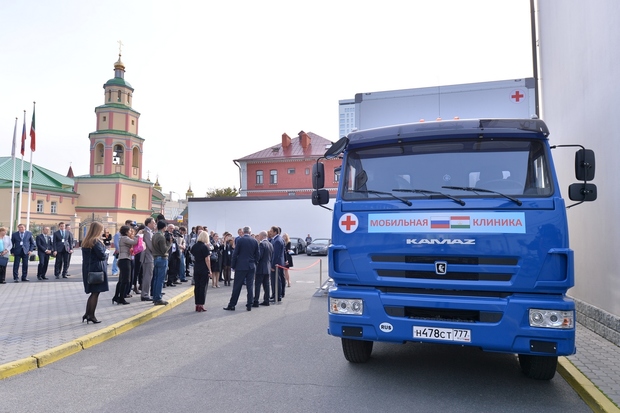
Tuberculosis, HIV and rise in syphilis morbidity rate as the major migration issues
One of the major migration problems is related to health. To be more precise, we mean numerous infectious diseases that migrants turn out to have. Russia has been fighting, controlling and supervising HIC, AIDS and other infectious diseases in the person of Rospotrebnadzor and the UN United Programme in six countries since 2013: Azerbaijan, Belarus, Kyrgyzstan, Tajikistan and Uzbekistan. One of these countries – Tajikistan – was given a mobile medical and diagnostic complex based on KAMAZ that makes a test for HIV more available before the official opening of the conference in Kazan.
Health Minister of Tatarstan Adel Vafin told that 39,087 migrants were screened last year in the republic. There were detected 37 cases of HIV infection, 60 cases of tuberculosis and 130 cases of syphilis.
'The annual numbers are quite stable. The syphilis morbidity rate has grown. For instance, last year there were 37 cases of HIV, while we have detected 24 cases during 8 months this year. In other words, we can't say there is a growth of HIV infections, but there is a rise in syphilis morbidity rate,' told the Minister.
According to him the system of a single window used in the migrant's medical examination and the system of epidemiologic measures held in Tatarstan while detecting the diseases can be used as successful experience in the Russian Federation.
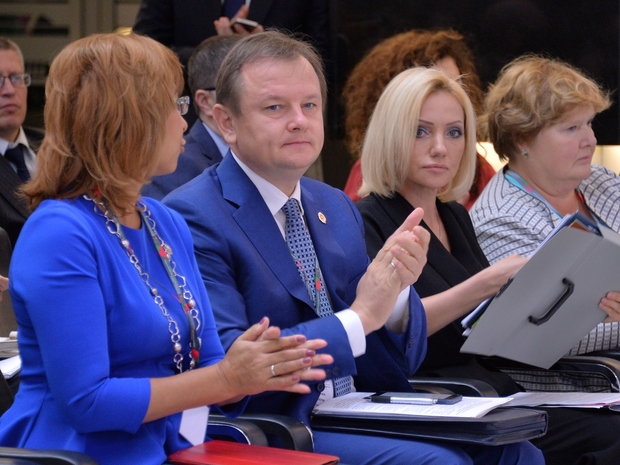
The deputy head of the Federal Service for Surveillance on Consumer Rights Protection and Human Wellbeing Boris Kuzkin noted that adjacent territories to Russia like Tajikistan, Mongolia, Uzbekistan are natural hotbeds of diseases. And the greater the migration is, the more conditions are created for transmission of mutual infections. Apart from HIV and AIDS, the expert enumerated other diseases too.
'I've said we have had a problem with poliomyelitis. A new strain of cholera is very active. And we suppose it will aggravate – we also need to keep our eye on the ball,' told Kuzkin.
Measles, rubella, enterovirus infections and tuberculosis are among other diseases.
'Unfortunately, tuberculosis, HIV and reproductive tract infections are the main reason why migrants can't stay in Russia. The three problems are spread among the migrants,' the deputy head of Rospotrebnadzor enumerated.
At the same time the numbers presented by a participant of the conference from Tajikistan tell about a rise in the amount of HIV infected people. 1,151 new cases of HIV were detected among foreign labour migrants in 2015 – it is 14,3% of all new cases of HIV. In 2014, the number of new HIV-positive people was 1,008, in 2013, they made up 876.
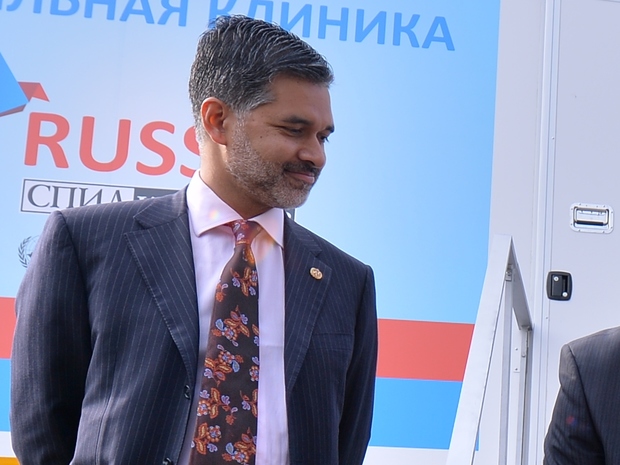
Refugees and migrants – not burden but potential!
The Regional Director for Eastern Europe&Central Asia Vinay Patrick Saldanha who presents UN programmes in Kazan told that, in the UN's opinion, Tatarstan could become an example of how problems of migration and acceptance of refugees should be solved.
It should be noted his speech at the official opening was headlined 'Refugees and Migrants – Not Burden But Potential!' where it was said that that processes could be positive for the host country. For example, Germany that has a lack of labour force will suffer rather from an economic loss because of the closed borders than acceptance of these migrants.
When the correspondent of Realnoe Vremya asked about his attitude to the moods of some European countries that close their borders for refugees and migrants, Mr Vinay Patrick Saldanha replied that 'the acceptance of the refugees and migrants is not only a fulfilment of their obligations as a UN member state, but it is correct from a development and economic growth perspective. We see the countries that have a more liberal attitude to the migration policy, accept migrants and refugees providing them with the whole range of necessary services as if they were citizens of this country during several tens of years – the UN bows low to them. During the crisis in Syria, many refugees are in camps. They are not only Syrian citizens who suffered from the civil war. They are also teachers, doctors, lawyers who will be glad to work for the economy of the countries who are ready to accept them'.
As for the closure of borders for refugees in Europe, the interlocutor expressed hope that all European and world countries would fulfil their obligations within the General Assembly Resolution on migration issues adopted last week.
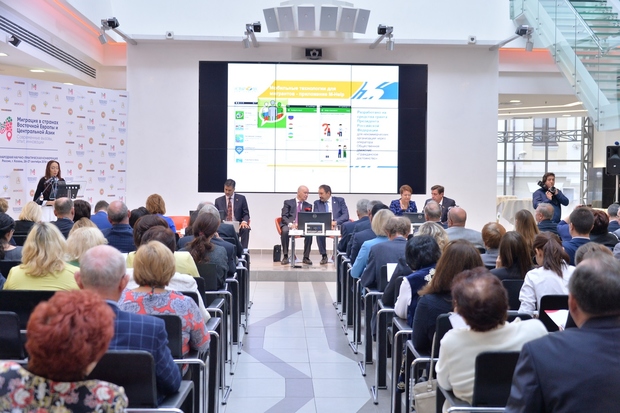
Internet as the most important thing for migrants
The director of Novy Vek charity non-commercial organisation Liliya Taisheva who participated in the summit of the UN General Assembly with the delegation from Russia told about the integration of migrants in the economy of a country, a balance of the rights of migrants and citizens and what was done for this purpose in Tatarstan.
And Taisheva expressed, at first sight, an unclear thought, which was stated by her colleagues the Organisation of Islamic Countries at the summit of the UN Assembly. According to them, the first request is related to the access to the Internet.
'The Telecommunication Union told that smartphones don't substitute food, they help in a different way,' the director continued. Taisheva reminded that there was an application for migrants in Tatarstan, which appeared due to the Russian President's grant, that provides with juridical, legal and medical help. The application has three languages: Russian, Uzbek and Tajik.
'These services are in a high demand among the migrants. Today we are receiving requests to increase the number of languages of the application and create an app for iOS,' told Taisheva.